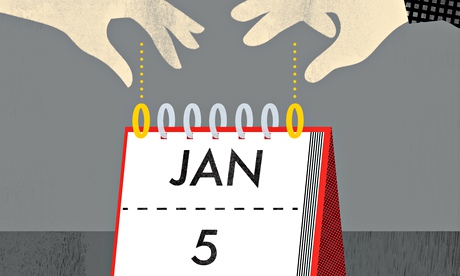The conservative narrative baffles: how can tying the knot be both a moral choice and an insurance policy?

It’s “divorce day”, the first working Monday after Christmas, customarily the busiest time of the year for family lawyers. In this age of constant contact, there’s been a modest surge in people seeking advice between Christmas and New Year, but for most, Twelfth Nisi is today (a half-pun for those who have already begun their divorce). If you’re married, there is a one in five chance you’re considering a split (according to a survey by legal firm Irwin Mitchell); it sounds improbably large, but there it is. If it’s not you, it’s probably him; check his phone, that’s how all the best divorces start.
Sir Paul Coleridge, a former high court judge, runs the Marriage Foundation, a charity that encourages getting and staying married. He told the Sunday Times, as part of a marriage-promotion drive in the lead-up to D-Day, of a case he’d seen: “She was the long-term girlfriend of a very high-profile celebrity person by whom she had had no fewer than four children. It was looking as if it was going to come unstuck, and she wanted to talk to me informally about what her position was. She said, ‘We’ll no doubt need an hour or two.’ I said, ‘We’ll need a minute or two because the answer is very simple: you have no rights.’”
Many people – in the 18-34 age group, almost half – believe that “common law” marriage actually comes with rights attached; that cohabiting couples with children have the same access to each other’s incomes, in the event of a split, as married ones do. This is untrue, though the “no ring, no rights” rallying cry of the marriage lobby is a bit of an overstatement (maintenance obligations obviously exist for the non-resident parent, whether previously married or not). This can prove disastrous for the main carer, who is unlikely to be the higher earner and, labouring under an illusion of legal protection, may have made no attempt to shield their finances from the hit of parenthood.
Family lawyers are divided on the answer – some would like to see new legislation that brings the common law into the purview of the actual law. Others, like Coleridge, see this as totally illogical; marriage, being limitless in both time and liability, is about the most profound contract a person can enter into. You can’t just slide into it, via cohabitation and parenthood; you have to enter into it willingly. His view is that marriage must be taught in schools (as a good idea, that is; I believe children already broadly know that it exists), and he’s supported in this by the Centre for Social Justice (CSJ), among others. There is something touchingly absurd about the amount of store people set by telling children things in schools – as if, when you want to alter behaviour, you simply insert a lesson and make it so. It doesn’t even work with oral hygiene.
Conservative belief in the institution of marriage runs like this: making a commitment to one another is what moral people do, and this makes marriage the most stable of all known relationships. Since stability is good for children, marriage is good for children (this mantra is given by the CSJ, especially, as something akin to gravity in its self-evidence).
Then, finally, if it all goes Pete Tong, you have the protection of the law, without which the weaker party may well end up dependent on the state. (The Sunday Times article was illustrated rather vividly by the story of a woman who, while waiting two and a half years for her husband to pay maintenance, said: “I’m pretty sure I cost the government around £400,000.”)
Few of these suppositions make much sense. There’s nothing moral about making a promise, the moral part is in keeping it, which 42% of married people don’t. Arguably, cohabiting couples are more moral than married ones, never making the promise in the first place that, most people agree and 42% prove, is rather unrealistic. In many cases, the so-called stability conferred by marriage is indistinguishable from that bestowed by wealth, which has itself become a major determinant of people’s decision to get married. But the critical contradiction, the bit I really cannot compute, is the idea of marriage as at once a moral choice and an insurance policy. It’s one or the other, surely? The abnegation of the self in the search for true togetherness, or a bid for your spouse’s income: how can it be both?
A conservative would see no contradiction, here: to have taken out the insurance policy of marriage is to have assured one’s self-sufficiency, thus protecting the state from its otherwise 400k liability (that figure does seem improbably high, but let’s go with it). Self-sufficiency is a moral act, to a conservative. In practical terms, this is nonsense; you may have left a copper-bottomed marriage, but if you weren’t rich to begin with, it is highly unlikely that your family earnings will expand to cover two households. Forty-two per cent of single parents live in poverty, 63% have no savings, 71% of all those renting are on housing benefit; so “self-sufficiency” is a byword for affluence, which then has moral superiority conferred upon it.
This is a recurring motif in the political mood music, cropping up in discussions from marriage to poverty to growth. The view from the right is that the ultimate in respectability is to need nothing from anyone: to which the left generally answers, self-sufficiency is about systems, and in the current system, it is very hard to be self-sufficient, however hard you work. But perhaps the question should be: what’s so wrong with needing one another in the first place?

No comments:
Post a Comment